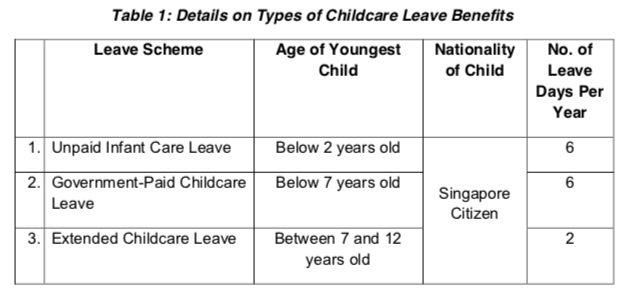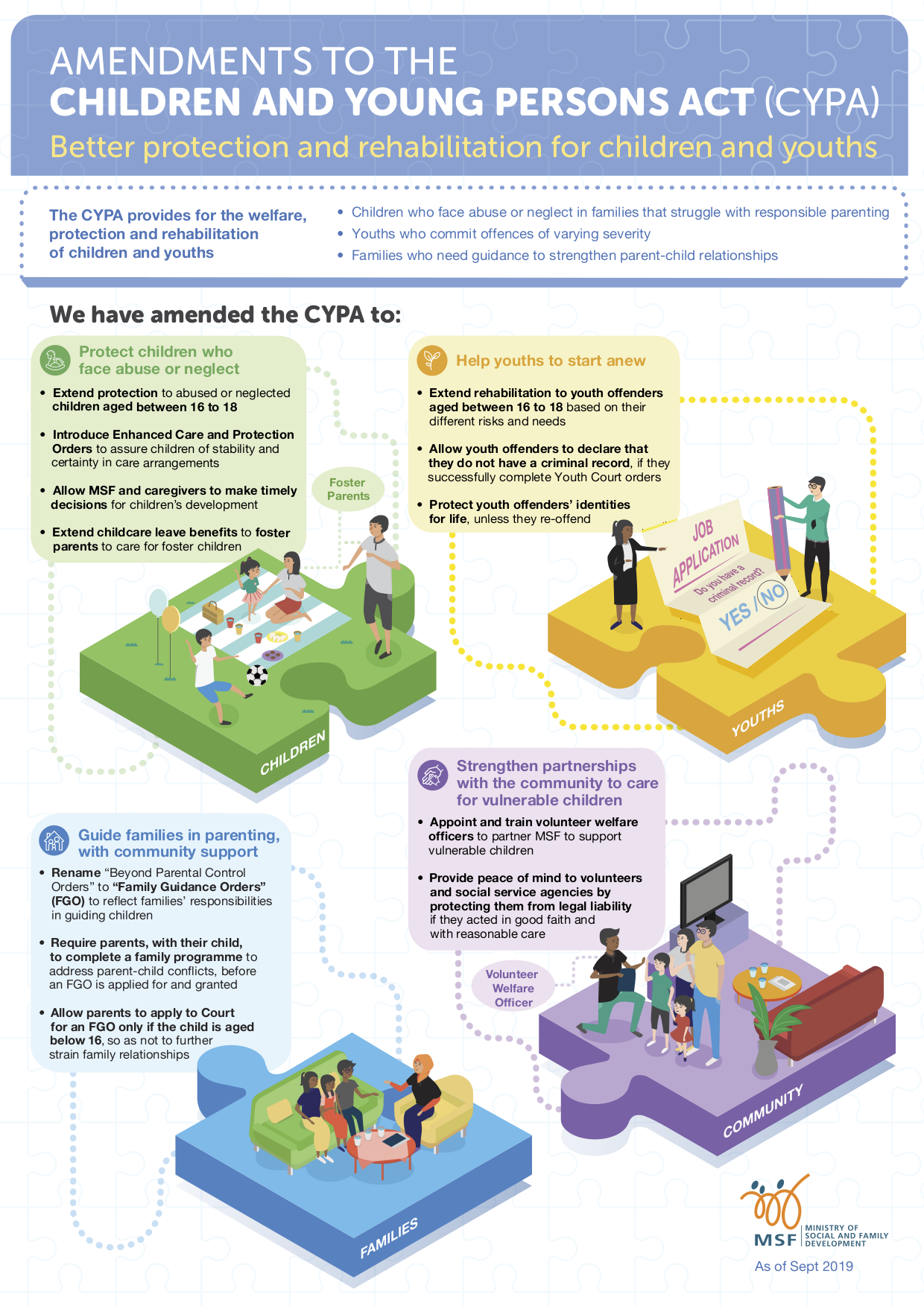A law in Singapore which protects children exposed to abuse or neglect has been amended to provide them with more protection and support.
The Children and Young Persons Act (CYPA) is a legislation that provides for the welfare, protection and rehabilitation of children and young persons.
When it comes to the small number of families who require help to fulfil basic responsibilities to their children, the CYPA is crucial and may in some cases, be a lifesaver.
In August 2019, Minister for Social and Family Development Desmond Lee proposed several amendments to the CYPA to strengthen support and care for abused or neglected children, and improve the rehabilitation and re-integration of youth offenders.
Lee emphasised during the parliamentary debate of the Bill on September 3 and 4, that the main principles of the CYPA are that “parents have the primary responsibility for the care and welfare of their child”, and that “the welfare and best interests of the child must be the first and paramount consideration”.
The Bill ensures “better outcomes for children, and breaks the cycles of abuse, neglect and offending,” Lee said.
Here are some of the key amendments.
For abused and neglected children
Currently, the CYPA protects children below the age of 16 from abuse or neglect, allowing the Ministry of Social and Family Development (MSF) to intervene in such cases.
The new Bill extends protection to those under 18, in line with the United Nations Convention on the Rights of the Child.
New Enhanced Care and Protection Order
Sometimes, there are challenging and precarious situations where families are unable to provide the necessary care for a child.
The Court might have assessed that some families are not fit to care for the child and that it is not appropriate to place the child under the care of these families.
In such cases, the new Enhanced Care and Protection Order (ECPO) empowers caregivers such as foster parents to make day-to-day, as well as more substantive decisions for the child that would normally require parental consent. These decisions can include things such as choice of school or overseas travel.
Parents however, still have a say—if they disagree with decisions made by MSF or caregivers, they can bring the matter to court.
The ECPO can last until a child turns 21 years old—it ensures certainty and stability for the child to recover should his or her parents struggle to provide proper care and a safe home environment despite efforts to reunite the family.
Childcare leave for foster parents
Foster parents are crucial in providing safe, stable and loving homes—something many might take for granted—that vulnerable children may not have.
There are currently 510 foster families in Singapore, Lee mentioned.
Foster parents are currently not eligible for childcare leave for their foster children. They need to use their annual leave to care for them.
But with the new Bill, foster parents will be able to receive childcare leave benefits as well, which they can use to bring their foster child to the doctor for example, or to a therapist.
MSF plans to implement these childcare leave benefits in 2020.
Below are the three types of childcare leave schemes under the Child Development Co-Savings Act that natural parents are currently entitled to.
These will now be extended to foster parents as well.
 Screenshot from MSF
Screenshot from MSF
Childcare leave benefits that foster parents will now receive. Screenshot from MSF
For children with offending behaviour
The new Bill also gives a second chance to youth who commit offences, as they may have made mistakes due to challenging family circumstances or the lack of proper family support and guidance.
The amendments to the CYPA will enhance the rehabilitation and re-integration of youth offenders, and coverage will be broadened to include those above the age of 16 and below the age of 18.
This will allow more youth to benefit from the rehabilitation options available under the CYPA, as opposed to being treated as an adult offender.
Second chances for youth offenders
Oftentimes for those with a criminal record, “doors may remain closed, and the sense of rejection can be daunting.”
Said Lee in Parliament:
“For youth offenders who have been successfully rehabilitated, we must make sure that they have the best shot in life. But often, the label of being an ex-offender tends to stick. This makes reintegration more difficult.”
With the new Bill, a youth's criminal record will be deemed spent when the individual completes Youth Court orders, such as community service, detention or Juvenile Rehabilitation Centres orders.
This means that the youth offender is able to lawfully declare that he/she has no criminal record after successfully completing the orders.
This new amendment gives young offenders a second chance and opportunities to turn over a new leaf.
Lifetime identity protection
Currently, the CYPA mandates that the identity and privacy of a child is protected if he/she is below 16 years old.
The new Bill ensures that the identity of a child covered under the CYPA remains protected for life, unless he or she reoffends.
Family Guidance Orders
Renaming Beyond Parental Control Orders
Currently, parents can apply to the Youth Court to seek help for children who might display difficult behaviour such as running away. These children are labeled as “Beyond Parental Control”.
If the application is accepted, the court will then place these children under the supervision of an appointed person, or in selected children’s homes.
With the new Bill, the term “Beyond Parental Control” (BPC) order will now be replaced with the new term, “Family Guidance Order” (FGO)
The previous term appears to place the blame for children’s behaviour solely on the children themselves when “it is just as, if not more important, to address poor parent-child relationships and poor or absent parenting,” Lee said.
The term “Family Guidance Order” makes it clearer that the focus is on the role of and dynamics within the family.
Mandatory Family Programme
Aside from the new name, the FGO will require parents and child to complete a family programme, before the parents are able to file for a court application.
In the case where the child refuses to participate, the court may allow parents to file an FGO application before completing the programme, and have the family complete the programme subsequently.
Previously, the court could only order parents to attend mediation, counselling, psychotherapy, or other programmes after a BPC order was made. Now, the court can do this before, during or after FGO applications are heard.
Strengthening partnerships with the community
Child protection work is currently carried out by MSF’s Child Protective Service, which partners social service agencies and family service centres. Many trained volunteers are involved.
The amendments will ensure that these volunteers are provided statutory support and legal protection.
MSF will also be able to appoint members of the public as Volunteer Welfare Officers and provide them with proper training. These officers can then perform duties such as visiting the home of a child to monitor his/her safety, in child abuse cases.
To enable community partners and volunteers to work with families towards a resolution, or intervene quickly to protect children from harm, MSF can now share information pertaining to the child with them
Sometimes, conflicts within families can create hostility and acrimony towards the community partners, volunteers and foster parents that work with them, which might pose a risk to these individuals.
The Bill now protects them from legal liability, “as long as they have acted in good faith and with reasonable care”.
The amendments to the CYPA help to protect not just abused and neglected children and youth offenders, but also foster parents and volunteers working to provide these children with proper care, guidance and better lives.
 Photo courtesy of MSF
Photo courtesy of MSF
This sponsored post by the Ministry of Social and Family Development made the author realise the importance of a loving and caring home for all.
Top photo courtesy of MSF Singapore
If you like what you read, follow us on Facebook, Instagram, Twitter and Telegram to get the latest updates.
